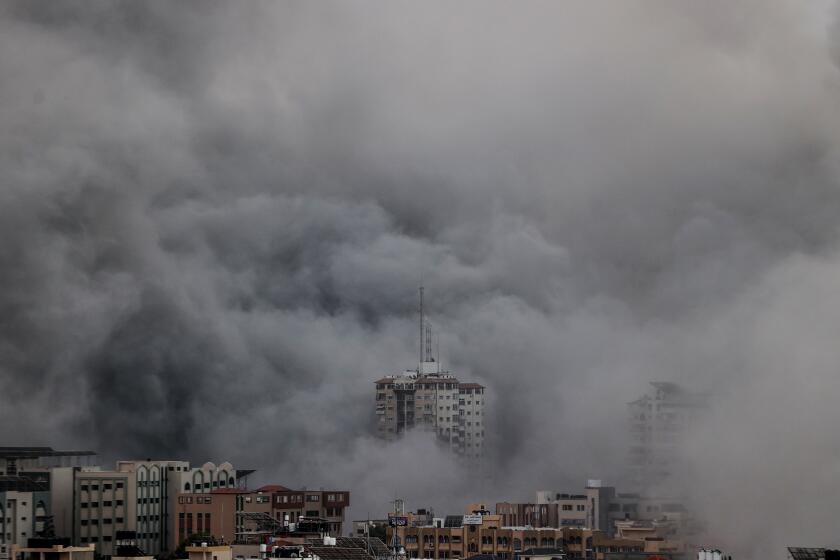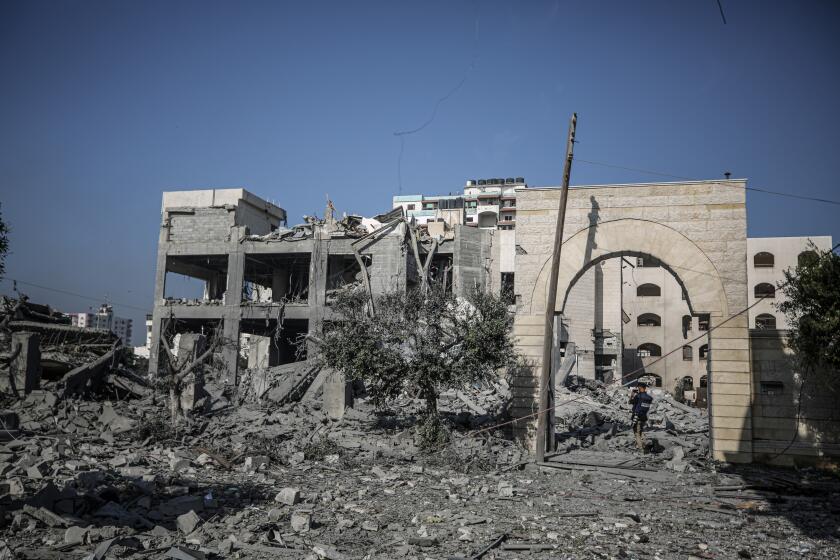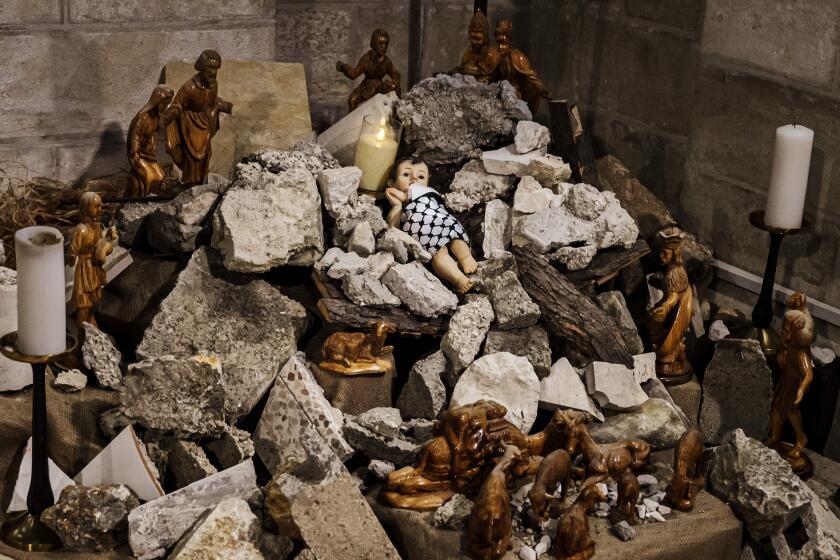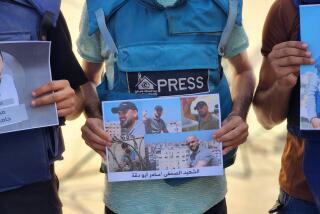Opinion: What does it feel like to be dehumanized? Just ask any Palestinian
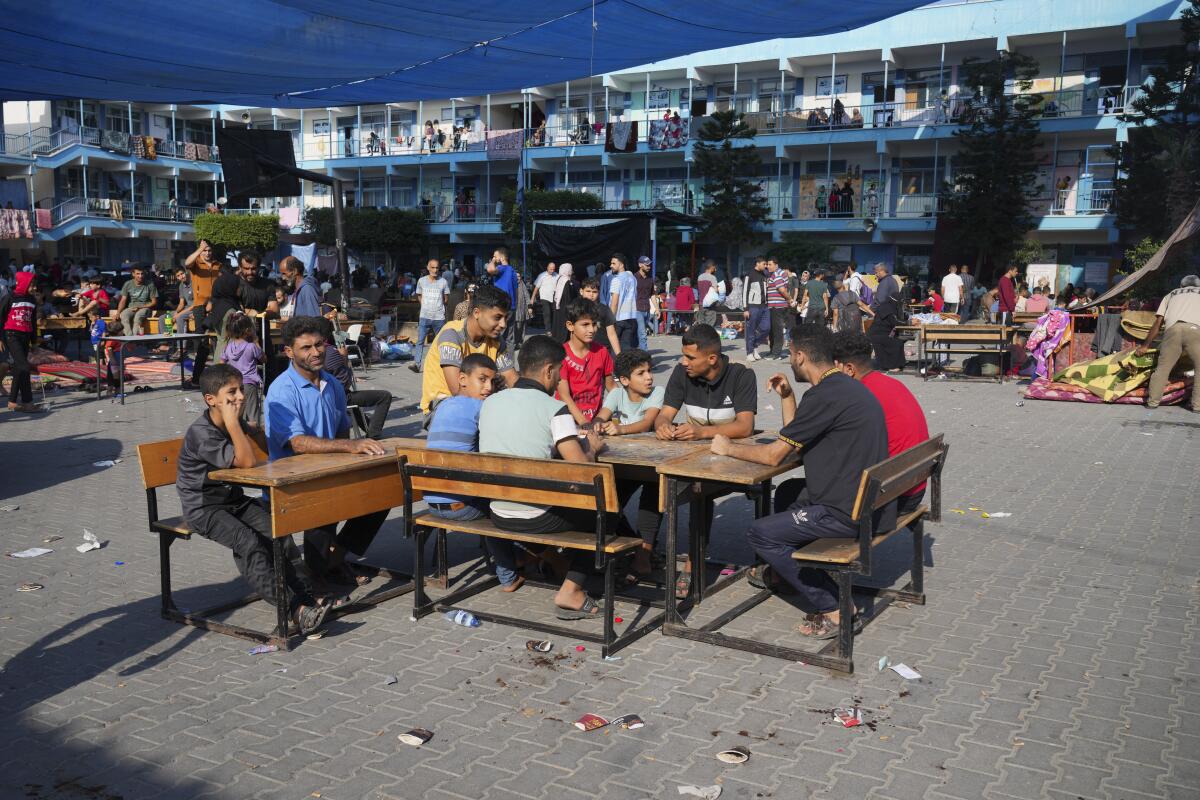
- Share via
For the past 11 weeks, we Palestinians have seen enough tragedies to fill several lifetimes.
More than 20,000 of us in the Gaza Strip have been killed by Israel. An analysis found that’s proportionally higher than the average civilian death toll in conflicts from World War II till the 1990s. Two million Gazans are now displaced inside this narrow and impoverished piece of land — crammed into homes, schools or in tents on the rubble that once was our homes. The majority are on the verge of starvation.
The Palestinian coders and techies I worked with built bridges to Silicon Valley. Amid Israel’s bombing, their vision of a new future for Gaza is crushed.
The soaring numbers may no longer shock you. Your becoming inured to our suffering is part of the dehumanization that we Palestinians must endure.
But we are not merely horrific statistics. I am from Gaza and to me, these figures have faces, names and stories of and about people whom I love and know.
The American response to Israel’s bombardment in Gaza risks U.S. standing in the region and around the world for years to come.
As a fellow Palestinian and friend here in the U.K. put it recently, banging the table: “They killed Gaza’s intellectual and professional elite, destroyed libraries, ancient mosques and churches, and cultural centers throughout the strip. What have the libraries done to them?”
The general impression among us Palestinians — whether at home or abroad — is that as Israeli tanks rolled into Gaza, what the soldiers saw contradicted their worldview of the inferior, subhuman Palestinian. They had to destroy all and re-create an image of Gaza that matched their imagined worldview. As if to say, dehumanize to facilitate and justify the culling.
Governments and outside organizations can do a lot to preserve collections when disaster is looming. Even so, a part of human identity is erased with each library bombed.
This realization is so upsetting that it overwhelms one with an uncontrollable urge to prove one’s humanity. There is also an urge to communicate, to externalize that feeling.
To ask ourselves, and to ask you: What does it feel like to be dehumanized?
Many pregnant women are giving birth in cars and on the street — this Christmas in Gaza there is literally “no room at the inn.”
We have been denied agency, as a people and as individuals. And, with the loss of agency, whatever aspirations for justice and self-determination we have — the basics you take for granted — became meaningless.
Some of you are finally starting to pay attention, although we remain outraged that this had to come at the expense of 20,000 lives. But you may still not know what it feels like to be dehumanized. So, please, allow me to take you into our Palestinian circle.
Perhaps the hardest part is processing the dehumanization, which triggers three negative emotions: a burning but incomprehensible sense of humiliation, guilt and rage. Each one of these emotions feeds into the other to create the perfect psychological storm within one’s soul.
“I feel guilty about feeling humiliated, but I am also shaking with a raging how-dare-you, you force me to justify my humanity?” another friend, a university lecturer in the U.K., told me.
I see where she is coming from. On the receiving end of dehumanization, you are stripped of your moral worth. It feels like others have no obligation to grant you the moral standards that are generally reserved for those whom they consider fully human. That typically leads to distorted self-awareness and a sense of dissociation from reality.
My friend’s words raise the question: Why do so many of us, in Gaza and abroad, feel ragingly humiliated by the loss of our loved ones?
Is it helplessness? Or because we did not have the chance to say goodbye? Or because we have yet to process the loss and grief?
I think it may be the randomness and pointlessness of the deaths, the horrifyingly quick and undignified burials, or worse, the scenes of decomposed bodies on the streets. Is this what it comes down to?
After all, many of us feel we are being culled, usually a term reserved for animals. Israeli leaders have called us “human animals,” treated us for decades as such, and now their bombs are eliminating evidence that contradicts their view of us.
Some people in Gaza spoke to me about apathy, numbness and desensitization, as if the lack of feeling is their coping mechanism to sever themselves from their natural emotionality, and to preserve what is left of their sense of self and dignity.
My mother did this by going out to visit my aunt who sheltered in a UNRWA school at the Nuseirat refugee camp, not caring for the potential Israeli snipers on top of the nearby buildings.
“I did not care, I even walked in the middle of the street,” she said, to my absolute horror.
She was seeking meaning in seeing her sister, and re-establishing her sense of free will and self-worth that often came out of her social life.
I wonder, to external eyes, are the dead and injured we see pulled from the rubble covered in blood viewed as victims, or does their roughed-up state lessen their humanity?
We Palestinians do not choose to be roughed up. How can we prove to you that we are worthy humans?
To tell you that Gaza — where people now line up for hours to get some water — has one of the world’s lowest illiteracy rates and highest rates of PhD holders per capita?
Or perhaps I can tell you about my cousin’s wife, Iman, the mathematical genius, who was killed with her kids last week.
Maybe you want to hear about my friend Jehad, the calligrapher, and the most generous, funniest man you could ever meet. They killed him and his family as they slept in his home in Shujaiya in eastern Gaza City.
How about Mahmoud, the doctor, who was killed by an Israeli sniper at Awda Hospital in northern Gaza?
It is painful to think of their former existence as irrelevant. It is even more painful to think of their death as meaningless.
Against all odds, they persevered and achieved highly. If anything, they were a special kind of human.
I wish you could have met them.
Emad Moussa is a Palestinian-British researcher and writer specializing in the political psychology of inter-group and conflict dynamics.
More to Read
A cure for the common opinion
Get thought-provoking perspectives with our weekly newsletter.
You may occasionally receive promotional content from the Los Angeles Times.
